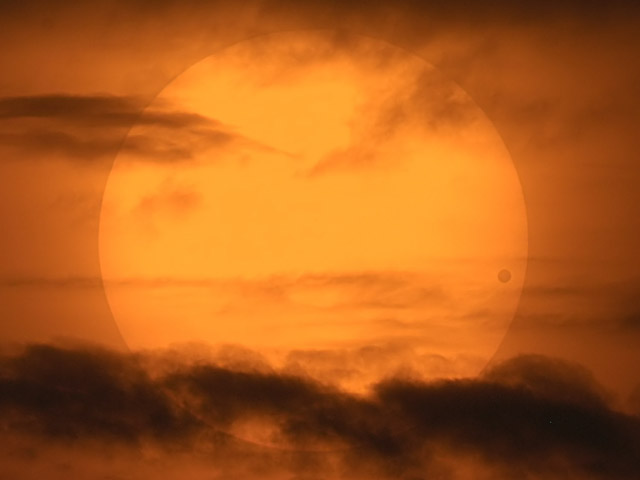Credit & Copyright: David Cortner
Explanation:
The rare
transit of Venus across the face of the Sun earlier this
month was one of the better-photographed events in sky history.
Both scientific and artistic images have been flooding in from the areas that could see the transit: Europe
and much of Asia, Africa, and North America.
Scientifically, solar photographers confirmed that the
black drop effect
is really better related
to the viewing clarity of the camera or telescope than the atmosphere of Venus.
Artistically, images might be divided into several categories.
One type captures the
transit in front of a highly detailed Sun.
Another category captures a double coincidence such as both Venus and an airplane simultaneously silhouetted, or Venus and the International Space Station in low Earth orbit.
A third image type involves a fortuitous arrangement of interesting looking clouds,
as shown by example in the
above image
taken from
North Carolina,
USA.
There the distant orb of giant
Venus might have been mistaken,
at first glance, for a small but unusually circular cloud.
1999 2000 2001 2002 2003 2004 2005 2006 2007 2008 2009 2010 2011 2012 2013 2014 2015 2016 2017 2018 2019 2020 2021 2022 2023 2024 2025 |
Yanvar' Fevral' Mart Aprel' Mai Iyun' Iyul' Avgust Sentyabr' Oktyabr' Noyabr' Dekabr' |
NASA Web Site Statements, Warnings, and Disclaimers
NASA Official: Jay Norris. Specific rights apply.
A service of: LHEA at NASA / GSFC
& Michigan Tech. U.
|
Publikacii s klyuchevymi slovami:
Venus - transit - Sun - Venera - Prohozhdenie - Solnce
Publikacii so slovami: Venus - transit - Sun - Venera - Prohozhdenie - Solnce | |
Sm. takzhe:
Vse publikacii na tu zhe temu >> | |
